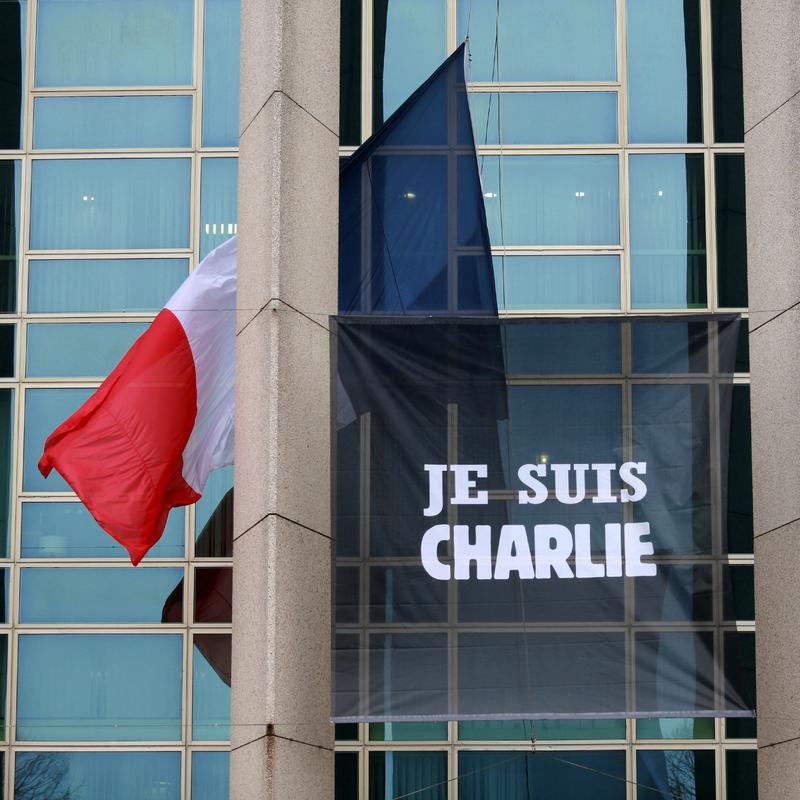BROOKE: I’m Brooke Gladstone.
[Chanting “liberté d’expression!]
BOB: Much of the Western World was horrified this week by a massacre at a French weekly, Charlie Hebdo, which specializes in caustic, line-crossing cartoons. Here’s French President Francois Hollande.
HOLLANDE: (translated)
It’s an act of exceptional barbarity that has just been committed here in Paris against a newspaper. A newspaper that stands for freedom of expression. Against journalists determined to defend their ideas, and the liberty that the Republic protects.
BOB: Charlie Hebdo, was known for equal opportunity skewering, especially in the realms of religion and politics. But it was notorious for its scorching, sometimes salacious depictions of the prophet Muhammad.
CHARBONNIER: Our job is not to defend freedom of speech. But without freedom of speech, we are dead.
That was Charlie Hebdo’s editorial director Stephane Charbonnier speaking to ABC NEWS a year after the paper had been firebombed after an especially risky issue, one which the paper audaciously declared had been edited by Muhammad himself. (Who, was depicted nude.) Charbonnier was murdered Wednesday, along with eleven others, including one Muslim policemen, by gunmen captured on video. It was horrific. Sickening. And yes, an unambiguous attack on a core democratic principle, free speech. Many in the past had often accused the paper of going too far. That was its raison d’etre. But the gunmen who committed the massacre (killed Friday when police stormed their hideout) turned Charlie Hebdo into a cause celebre.
BROOKE: Daniel Schneidermann, a long time media critic, is editor of the French media criticism website, Arret-Sur-Image. He’s followed the path of Charlie Hebdo since it’s birth in in 1970.
SCHNEIDERMANN: You know they’ve always been anti-cleric. But being anti-cleric in the 60s and 70s - that meant being anti-Pope and anti-Catholic clerics. And it all changed when the new century started. They started to cartoon against Islam. And it became harder and harder for them. The situation got more extreme, on both sides. I sometimes thought they were going too far. They came to my show and we debated about that. Some people told them, 'Why do you humiliate Muslims people?' And they defended themselves - I was very happy we could have this debate in a free country - which is France. I think censorship is never a good solution. I learned today for instance that the New York Times did not publish their cartoons. I think that's not a good solution.
BROOKE: You wondered whether or not they had gone too far. Now you feel that news outlets should be publishing some of those very same crass cartoons.
SCHNEIDERMANN: Yes, of course! There is no contradiction. It has a right to be published. You must be able to debate about it. That's it. And today I'm just horrified by what happened. I want this newspaper - I want this magazine to still be able to go too far. That's important. We hear about these sorts of issues in countries that are very far away from this. We hear about these issues in Mexico. We hear about these issues in Columbia. We hear about these issues in Middle East countries. But in France, we could never imagine we could face such a drama.
BROOKE: Several French mosques have already been attacked in the very short period since the attack on Charlie Hebdo. Does that worry you?
SCHNEIDERMANN: Yes, of course. I think most French people don't think that Muslims in general are responsible for what happened. Muslims in general strongly disagree -- of course -- with this terrible massacre.
BROOKE: But does this provide an opportunity for the right wing and nationalist parties to dig in their heels? I mean, do you find some irony in the fact that the right wing has to stand with a left wing journal that it's long hated? I mean, only last week the cover featured former rightist President Sarkozy having sex with male homophobes.
SCHNEIDERMANN: What's very funny is not Sarkozy - what's very funny is: the extreme right Marianne LePen wanting to demonstrate for Charlie Hebdo.
BROOKE: The ultra-nationalist party in France.
SCHNEIDERMANN: Yeah. Which is very high in the polls, you know? Charlie Hebdo was very hard against her. They depicted them as Nazis. Now she does the thing: I want to have a very huge demonstration next Sunday in Paris. We are in a very ironic situation in France. I remember September 11th. I remember how something broke inside of me. I felt the same. Exactly the same when I learned about this massacre. I felt very strongly that there had been a before - and there should be an after. September 11th -- nobody could say what would happen in the next years in America. I think unfortunately we are in the same situation.
BROOKE: Daniel Schneidermann is editor of the French media criticism website Arret-Sur-Image.

